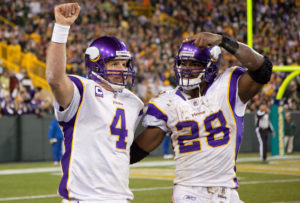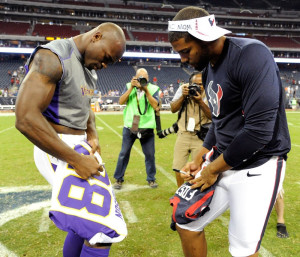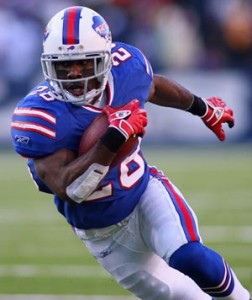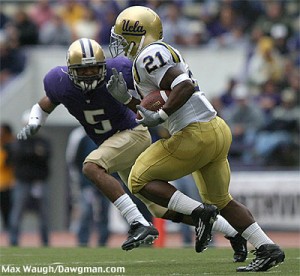During the 2013 offseason, I wrote 32 articles under the RPO 2013 tag. In my Predictions in Review series, I review those preview articles with the benefit of hindsight. Previously, I reviewed the AFC West, the NFC West, the AFC South, the NFC South, and the AFC North. Today, the NFC North.
The Detroit Lions will win more games in 2013, June 21, 2013
In 2012, Detroit finished 4-12, but they seemed like an obvious pick to have a rebound season. The Lions went 3-9 in games decided by 8 or fewer points that year, which was the worst mark in the league. Since such a poor record is usually a sign of bad luck rather than bad skill, Detroit wouldn’t need to do much to improve on their 4-win season. The Lions had 6.4 Pythagorean wins, and no team fell as far short of their Pythagorean record in 2012 as Detroit. There was one other reason I highlighted as to why Detroit would win more games in 2013: the Lions recovered only 33% of all fumbles that occurred in Detroit games. As a result, the team recovered 7.6 fewer fumbles than expected.
Of course, none of this was a surprise: Vegas pegged Detroit as an average team entering the season. And even though the Lions did finish 7-9, a three-win improvement wasn’t enough to save Jim Schwartz’ job. After a 3-9 record the year before, the 2013 Lions went 4-6 in games decided by 8 or fewer points, which included losses in the team’s final three games. Detroit did improve when it came to fumble recoveries, but only slightly: the Lions recovered 42.6% of all fumbles in their games in 2013, which was 3.6 recoveries fewer than expected.
What can we learn: When it comes to records in close games and fumble recovery rates, we should expect regression to the mean. Last year, the Colts (6-1) and Jets (5-1) had the best records in close games; Andrew Luck has been doing this for two years now, but no such benefit of the doubt should be given to the Jets. Meanwhile, Houston (2-9) and Washington (2-7) had the worst records in close games. All else being equal, we would expect both of those teams to improve on their wins total in 2014 (for the 2-14 Texans, it will take some work not to win more games in 2014; and, of course, such rebound seasons are already baked into the Vegas lines).
As far as fumble recovery rates, well, that’s one area where the Jets are hoping for some regression to the mean.
The 2012 Chicago Bears had the Least Strange Season Ever, August 2, 2013
Here’s what I wrote about the 2012 Bears:
The 2012 Bears played two terrible teams, the Titans and the Jaguars. Those were the two biggest blowouts of the season for Chicago. The Bears had five games against really good teams (Seattle, San Francisco, Houston, and the Packers twice): those were the five biggest losses of the season. Chicago had one other loss, which came on the road against the next best team the Bears played, Minnesota.
…
But the Bears didn’t just have a predictable season. That -0.89 correlation coefficient [between Chicago’s opponent’s rating and location-adjusted margin of victory] is the lowest for any 16-game season in NFL history. In other words, Chicago just had the least strange season of the modern era.
This post was not about predicting Chicago’s 2013 season but analyzing a quirky fact I discovered. The Bears struggled against the best teams in 2012, and that cost Lovie Smith his job. In 2013, Chicago’s season was much more normal; in fact, the Bears had a slightly “stranger” season than the average team.
The Bears did manage to defeat the Bengals and Packers (without Aaron Rodgers), but Chicago still finished below .500 against playoff teams thanks to losses to New Orleans, Philadelphia, and Green Bay (with Aaron Rodgers). After a 2-6 performance against playoff teams in 2012, I suppose a 2-3 record is an improvement. But the irony is that the reason Chicago’s season was less normal in 2013 wasn’t due to better play against the best teams, but because Chicago lost to Minnesota and Washington. In the first year post-Lovie, the Bears missed the playoffs because they lost to two of the worst teams in the league, causing them to miss out on the division title by one half-game. Here’s one stat I bet Lovie Smith knows: from 2005 to 2012, Chicago went 30-0 against teams that finished the season with fewer than six wins. As for which teams had the strangest and least strangest seasons in 2013? Check back tomorrow.
Can Adrian Peterson break Emmitt Smith’s rushing record?, August 3, 2013
What a difference a year makes. Eight months ago, the debate regarding whether Adrian Peterson could break Smith’s record was a legitimate talking point. After a “down” season with 1,266 yards in 14 games, nobody is asking that question anymore. Of course, Peterson never had much of a chance of breaking the record anyway, which was the point of my post. Not only had Smith outgained him Peterson through each of their first six seasons, and not only did Smith enter the league a year earlier than Peterson, but Emmitt Smith was also the leader in career rushing yards after a player’s first six seasons.
Peterson just turned 29 years old. He ranks sixth in career rushing yards through age 28, but Smith has a 1,119 yard advantage when it comes to rushing yards through age 28. Barry Sanders has them both beat, of course, but he retired after his age 30 season. The problem for Peterson? He needs to run for 8,241 yards during his age 29+ seasons to break Smith’s record. The career leader in yards after turning 29 is Smith with 7,121 yards.
What can we learn: Unless Peterson finds the fountain of youth, Smith’s record won’t be challenged for a long, long time.
Witnesses to Greatness: Aaron Rodgers Edition, August 30, 2013
In late August, I wondered if we had taken Rodgers’ dominance for granted. After all, he had a career passer rating of 104.9, the best ever. Then in 2013, he produced a passer rating of … 104.9, the fifth best mark among qualifying passers.
Passer rating stinks, as we all know, but Rodgers is dominant in nearly every metric. If we break passer rating down into its four parts we see:
- Entering 2013, Rodgers was the career leader in completion percentage. Drew Brees now holds a 0.1% edge over Rodgers in this category. Rodgers completed 66.6% of his passes last year, the 5th best mark of 2013.
- Rodgers was the career leader in interception rate entering 2013, and still holds that crown. Believe it or not, his 2.1% interception rate last year ranked only 12th.
- With a 5.9% touchdown rate in 2013 (5th best), he remains the active leader in touchdown percentage. Everyone ahead of him on the career list began their career before 1960.
- Rodgers was the active leader in yards/attempt prior to 2013, and then he had another dominant year by producing an 8.7 average (2nd best). He’s now widened his lead in this metric and should remain the active leader for the foreseeable future.
What can we learn: That Rodgers is the man? Of course, this year we got to see that first-hand. The Packers went 6-3 in Rodgers’ 9 starts and 2-4-1 without him, but remember, he threw just two passes in his Bears start, which the Packers lost. Count that as a non-Rodgers game, and Green Bay went 6-2 with him and 2-5-1 without him. From there, one might infer that he added 3.5 wins to the Packers last year, tied for the 4th most ever from a quarterback relative to his backups.
The only area where Rodgers struggles is with sacks, and it’s worth remembering that all of his other rate stats are slightly inflated because they do not include sacks in the denominator. He’s still the man, of course, but sacks, era adjustments, and the fact that he isn’t done producing top seasons is why he “only” ranked 12th and 14th on these lists.





